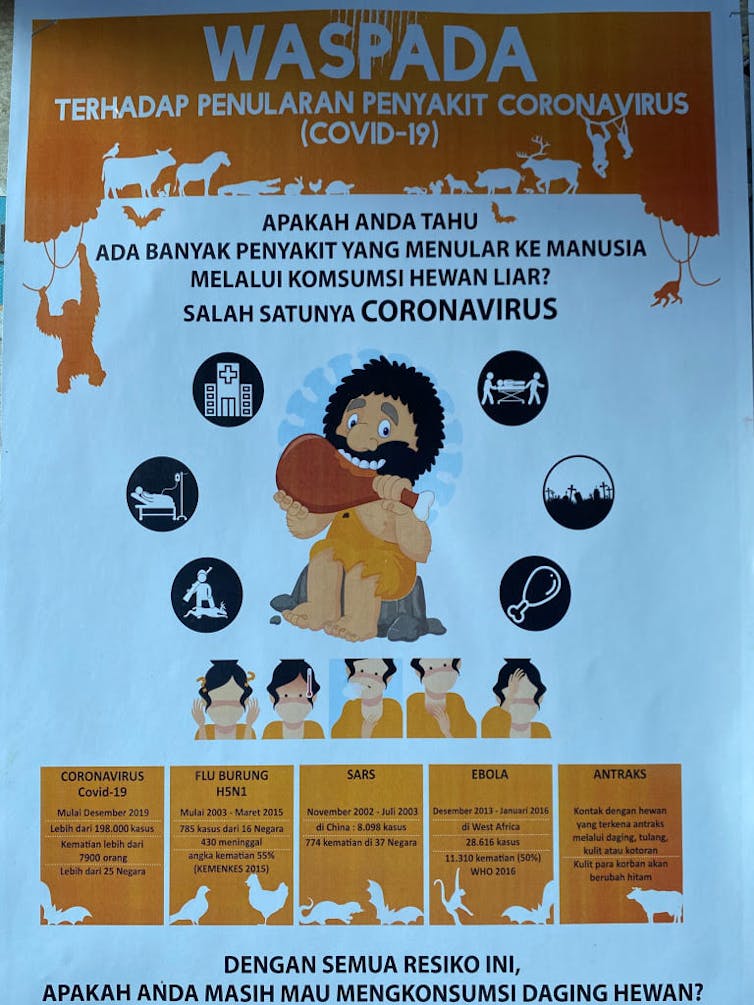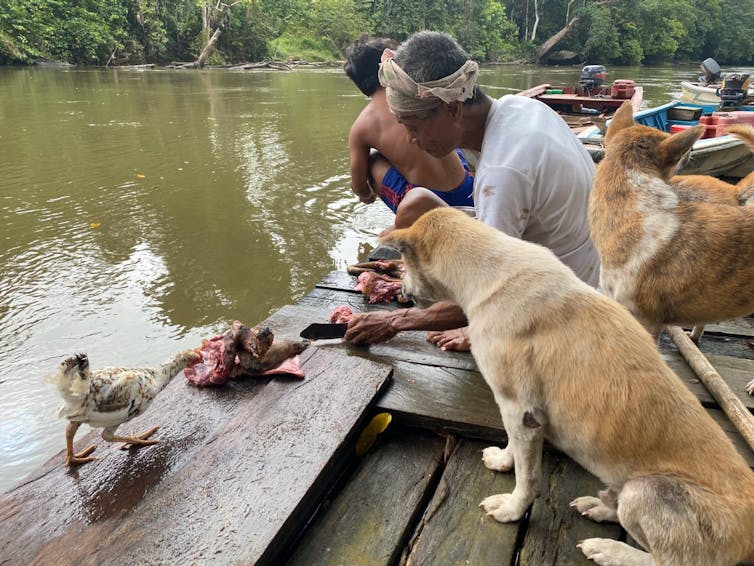
Paul Hasan Thung, Brunel University London and Liana Chua, Brunel University London
COVID-19 probably originated as a virus that jumped from wild animals to humans. So some conservation organisations have used the pandemic to campaign against the hunting and consumption of wildlife – and so to prevent future zoonotic disease transmission.
But our research with indigenous villagers in Indonesia has found that some of these recent anti-wildlife consumption campaigns miss a key point. Many villagers view COVID-19 as novel and modern, a problem associated with new ways of life, not their traditional hunting. For this reason, COVID-inspired anti-wildmeat messages have not convinced them, and are unlikely to succeed.
One of us (Paul Thung) has been doing fieldwork among indigenous Dayak people in the Indonesian side of the island of Borneo since late-2019. There, conservation organisations are attempting to dissuade rural communities from hunting and consuming wildlife like wild boar, deer, civets, porcupines or even orangutans.

The pictured poster is a good example. It starts with a warning about the coronavirus (“WATCH OUT for the spread of the coronavirus (COVID-19)”), connects this to the general danger of zoonotic diseases (“Did you know there are many diseases that spread to humans through the consumption of wild animals? One of them is the CORONAVIRUS”), then concludes with a suggestion to stop consuming wildlife (“With all these risks, do you still want to eat wild animal meat?”).
Similar examples can be found elsewhere in Borneo and the world.
At present, there isn’t much information about the effects of COVID-related conservation campaigns on the ground. However – in parts of rural Borneo, at least – such messages are not working. On the contrary, both villagers and forest rangers in Paul’s fieldsites report that hunting has increased in recent months. To understand why, we need to examine local perceptions of COVID-19.
COVID conversations
During fieldwork, Paul participated in and recorded many conversations about the origins of the coronavirus. Strikingly, he found that the zoonosis argument – that COVID-19 originates from wildlife – was usually met with scepticism. Instead, his Dayak interlocutors often suggested that the novel coronavirus was more likely to have been created by humans – for example, by scientists developing a weapon for biological warfare.
It may be tempting to dismiss such claims as conspiracy theories. As anthropologists, however, we seek to understand the local logic on which they’re based. Doing so reveals some striking mismatches between conservationists’ zoonosis argument and rural Dayaks’ experiences and perceptions of COVID-19.
First, the zoonosis argument takes traditional Dayak practices and turns them into a problem. It posits that wild animals, which Dayaks have hunted for centuries, contain many diseases that can harm people who eat them.
However, the conclusion that Dayaks should therefore stop hunting and consuming wildlife does not align with their long and seemingly unproblematic experience of eating wild animals. It is also at odds with their livelihoods, as wild meat is an important source of protein and income.

Second, most villagers in this area view COVID-19 as a decidedly modern phenomenon, centred in urban and wealthier regions. Here, as elsewhere in Borneo, people are highly aware of both the benefits and pitfalls of “progress” (kemajuan) and modernity.
Although everyone aspires to progress – to earn money, enjoy “modern” amenities and infrastructure – such changes are also seen to bring problems and risks. Transport infrastructure, for example, improves mobility for traders and travellers, but also invites excessive resource extraction, thieves and viruses. As someone said to Paul: “Corona travels by plane too.”
When the pandemic began, many rural Dayaks’ response was thus to turn towards tradition, not away from it. Many who had been working or studying in cities returned to their villages.
Physical work in the fields and forest, and eating natural foods (makanan alami) – including certain wild animals – were described as ways to boost one’s health. Among people Paul spoke to, it was widely argued that the virus, which seemed to thrive in cooler places and air-conditioned cities, would die outdoors under the sun.
Changing conversations
This failure of translation holds important lessons for conservationists. Crucially, it reminds us that conservation must be guided by local, on-the-ground knowledge and experiences.
Rather than only trying to educate others, conservationists must first educate themselves about specific local conditions and concerns. This means finding out what local people see as problems (COVID-19 as a modern, urban disease, for example) before working with them to find contextually-appropriate solutions.
In this case, conservationists might have been better off shifting their attention from the origin of COVID-19 to rural communities’ apprehensions about the (modern) conditions that enabled its spread. They could also have pinpointed ways of mitigating its knock-on effects such as economic hardship.
Such efforts would not have achieved the immediate goal of reducing wildlife hunting and consumption. But they could well have had a more productive long-term impact.
In rural Borneo, conservationists are sometimes said to care more about animals than humans. People can spot opportunistic conservation campaigns from a mile away.
The COVID-19 pandemic, however, is an opportunity for conservationists to prove their commitment to local people’s wellbeing. Building long-term relations of trust and respect gives conservation a far greater chance of succeeding in the long run.
This article was adapted from a longer piece on Pokok – a blog about human-orangutan conflict in Borneo.![]()
Paul Hasan Thung, PhD Student in Social Anthropology, Brunel University London and Liana Chua, Reader in Anthropology, Brunel University London
This article is republished from The Conversation under a Creative Commons license. Read the original article.

